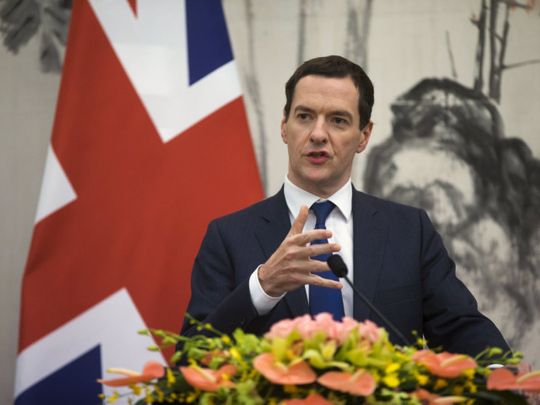
Here is the question. Can a state that counts itself America’s most reliable military ally also be China’s special friend in the West? Ask George Osborne, Britain’s Chancellor of the Exchequer, and the answer is an unequivocal “yes”. Others — in Whitehall as well as the White House — take a different view.
Osborne has been touring China, including the troubled Xinjiang province, where Beijing’s authority is challenged by native Uighurs. When the chancellor was not signing commercial deals he did everything to skirt controversy. His aim was to set up the signing of a string of financial and investment agreements when Chinese President Xi Jinping pays a state visit to Britain next month.
Osborne promised a £2 billion (Dh11.18 billion) taxpayer guarantee if Xi puts Chinese cash into a new nuclear power plant in southern England. He also offered Britain as a test bed for China’s own nuclear technology. Whitehall officials think that the nuclear project has been rendered uneconomic by shale oil and gas and by changing patterns of energy use. The chancellor will have none of it.
As he journeyed between Beijing, Shanghai and Urumqi promoting Britain as China’s “best partner” in the West, national security officials back in London were drafting a new national security strategy. Its centrepiece will be a reaffirmation of the security and military alliance with Washington.
David Cameron, the British Prime Minister, was badly shaken earlier this year by American criticism of a planned Unite Kingdom defence cuts. Now, having reinstated the 2 per cent Nato target for defence spending, he wants to show that Britain can still punch its military weight. The same thought is behind an effort to overturn a parliamentary bar on British bombing of terrorists in Syria.
As chance would have it, the defence review will also preface a big expansion of Britain’s capacity to counter cyberattacks. Many of these are directed from — you have guessed it — China.
It is rare for the Treasury to set the direction of foreign policy; the most powerful department in Whitehall has long shown institutional disdain for foreigners. Officials keep it quiet if they happen to speak a foreign language. So the outreach to Beijing is very much the chancellor’s personal project. Some say he has been dazzled by China’s rise. He seems to think China will supplant the US during the 21st century in much the same way as the US pushed aside Britain in the 20th. There has also been an element of pragmatism. He needs Chinese money to take some of the edge off domestic austerity.
So when Britain found itself in Beijing’s bad books after Cameron met the Dalai Lama, Tibet’s spiritual leader, Osborne overturned Foreign Office resistance to a humiliating climbdown. The prime minister duly repented the error of his ways and has since been scrupulous about not giving offence.
When Cameron visited east Asia during the summer, the Singapore government thought he might like to take the opportunity to say something about regional security. Britain, after all, is a member of Asia’s Five Power Defence Arrangements. Fearful of saying anything that might upset China, which is at odds with several of its neighbours and with the United States in the East and South China seas, Cameron demurred. His host was told he preferred to talk about the opportunities for Asian companies to raise capital in the City of London.
More recently, Osborne was behind Britain’s decision to break with the US and sign-up to the Beijing-sponsored Asian Infrastructure Investment Bank. Many in Washington would now agree that the US attempt to organise a western boycott of the new bank was at best ill-advised. Yet the chancellor’s motivation was less than strategic. He wanted to persuade his Chinese counterpart to choose London as the centre of offshore trading in the renminbi.
Some will say that Osborne is far from alone in his eagerness to grab a sizeable share of China’s newfound wealth. Angela Merkel, the German Chancellor, is forever leading German trade missions to Beijing while the US has not let arguments with Beijing get in the way of an expansion of business between the two nations.
That is true. What is curious is the British assumption that a healthy economic relationship demands a submissive stance on everything else — whether human rights or China’s contested territorial claims in the western Pacific. US President Barack Obama will feel no such compunction during his meetings with Xi this week.
Those who know China well say there is no evidence anyway that kowtowing, as such self-abasement used to be called, wins favourable treatment. To the contrary, Beijing tends to disdain those it perceives to be supplicants.
It is odd, too, that Osborne’s proposed special relationship with Beijing is all but disconnected from any broader assessment of Britain’s long-term strategic interests. The security and defence review will say that the country’s prosperity and security rest, above all, on preservation of the open, rules-based international system — an order that since 1945 has been underwritten by the US. Beijing sees this system as an expression of western hegemony.
There is nothing easy about balancing beneficial economic engagement with China with the safeguarding of Britain’s security. Nor should Britain necessarily always agree with the US. But there is more to Britain’s national interest than a few billions of Chinese investment in a dodgy nuclear energy programme.
— Financial Times












